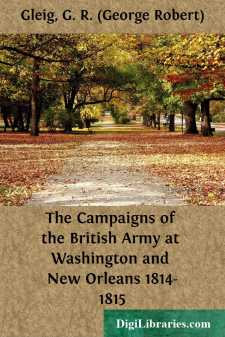Categories
- Antiques & Collectibles 13
- Architecture 36
- Art 48
- Bibles 22
- Biography & Autobiography 813
- Body, Mind & Spirit 142
- Business & Economics 28
- Children's Books 17
- Children's Fiction 14
- Computers 4
- Cooking 94
- Crafts & Hobbies 4
- Drama 346
- Education 46
- Family & Relationships 57
- Fiction 11829
- Games 19
- Gardening 17
- Health & Fitness 34
- History 1377
- House & Home 1
- Humor 147
- Juvenile Fiction 1873
- Juvenile Nonfiction 202
- Language Arts & Disciplines 88
- Law 16
- Literary Collections 686
- Literary Criticism 179
- Mathematics 13
- Medical 41
- Music 40
- Nature 179
- Non-Classifiable 1768
- Performing Arts 7
- Periodicals 1453
- Philosophy 64
- Photography 2
- Poetry 896
- Political Science 203
- Psychology 42
- Reference 154
- Religion 513
- Science 126
- Self-Help 84
- Social Science 81
- Sports & Recreation 34
- Study Aids 3
- Technology & Engineering 59
- Transportation 23
- Travel 463
- True Crime 29
G. R. (George Robert) Gleig
George Robert Gleig (1796–1888) was a Scottish soldier, chaplain, and author known for his vivid accounts of military life. He served as a British army officer during the Peninsular War and the War of 1812, which inspired his later writings. Gleig's notable works include "The Subaltern," a semi-autobiographical novel about a young officer's experiences in the Peninsular War, and "The Campaigns of the British Army at Washington and New Orleans" about his experiences in America. After retiring from the army, Gleig became a clergyman and continued to write, producing both military histories and religious works.
Author's Books:
Sort by:
CHAPTER I. THE GULDEN KRONE. COUNT THUN'S CASTLE AND GROUNDS. GLORIOUS SCENERY. THE MARCH RESUMED. SUPERSTITIONS OF THE BOHEMIANS NOT IDOLATRY. STATE OF PROPERTY. OF THE AGRICULTURAL POPULATION. KAMNITZ. THE COW-HERDS. STEIN JENA. HAYDE. We had quitted home not unprepared for the suspicious looks which innkeepers might be expected to cast upon us, strangely equipped as we were, rude of speech, and...
more...
CHAPTER I. A REVOLUTION must occur in the condition and sentiments of mankind more decided than we have any reason to expect that the lapse of ages will produce, before the mighty events which distinguished the spring of 1814 shall be spoken of in other terms than those of unqualified admiration. It was then that Europe, which during so many years had groaned beneath the miseries of war, found herself...
more...



